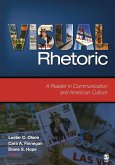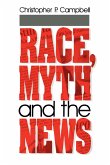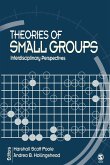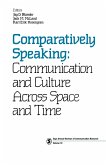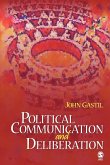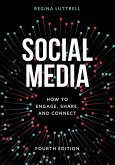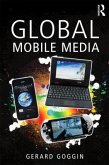- Broschiertes Buch
- Merkliste
- Auf die Merkliste
- Bewerten Bewerten
- Teilen
- Produkt teilen
- Produkterinnerung
- Produkterinnerung
This is a state-of-the-art overview of anthropological approaches to the study of media. An international team of contributors identify the major concepts, methods and bibliography involved and provide examples of current research. Together they introduce the issues, review the field and forge new conceptual syntheses. The book contains a `Theory into Practice' section that shows how anthropological concepts and methods can improve the teaching and practice of media and journalism studies.
Andere Kunden interessierten sich auch für
![Visual Rhetoric Visual Rhetoric]() Visual Rhetoric170,99 €
Visual Rhetoric170,99 €![Race, Myth and the News Race, Myth and the News]() Christopher P. CampbellRace, Myth and the News91,99 €
Christopher P. CampbellRace, Myth and the News91,99 €![Theories of Small Groups Theories of Small Groups]() Marshall Scott Poole / Andrea B HollingsheadTheories of Small Groups147,99 €
Marshall Scott Poole / Andrea B HollingsheadTheories of Small Groups147,99 €![Comparatively Speaking Comparatively Speaking]() Jay G. Blumler / Jack M. McLeod / Karl Erik Rosengren (eds.)Comparatively Speaking122,99 €
Jay G. Blumler / Jack M. McLeod / Karl Erik Rosengren (eds.)Comparatively Speaking122,99 €![Political Communication and Deliberation Political Communication and Deliberation]() John GastilPolitical Communication and Deliberation93,99 €
John GastilPolitical Communication and Deliberation93,99 €![Social Media Social Media]() Regina LuttrellSocial Media40,99 €
Regina LuttrellSocial Media40,99 €![Global Mobile Media Global Mobile Media]() Gerard GogginGlobal Mobile Media54,99 €
Gerard GogginGlobal Mobile Media54,99 €-
-
-
This is a state-of-the-art overview of anthropological approaches to the study of media. An international team of contributors identify the major concepts, methods and bibliography involved and provide examples of current research. Together they introduce the issues, review the field and forge new conceptual syntheses. The book contains a `Theory into Practice' section that shows how anthropological concepts and methods can improve the teaching and practice of media and journalism studies.
Produktdetails
- Produktdetails
- Verlag: Sage Publications, Inc.
- Seitenzahl: 370
- Erscheinungstermin: 1. Mai 2005
- Englisch
- Abmessung: 254mm x 178mm x 20mm
- Gewicht: 695g
- ISBN-13: 9781412906708
- ISBN-10: 1412906709
- Artikelnr.: 21210843
- Herstellerkennzeichnung
- Libri GmbH
- Europaallee 1
- 36244 Bad Hersfeld
- gpsr@libri.de
- Verlag: Sage Publications, Inc.
- Seitenzahl: 370
- Erscheinungstermin: 1. Mai 2005
- Englisch
- Abmessung: 254mm x 178mm x 20mm
- Gewicht: 695g
- ISBN-13: 9781412906708
- ISBN-10: 1412906709
- Artikelnr.: 21210843
- Herstellerkennzeichnung
- Libri GmbH
- Europaallee 1
- 36244 Bad Hersfeld
- gpsr@libri.de
Eric W. Rothenbuhler is Professor of Communication at Texas A&M University. He was previously Director of Graduate Media Studies at New School University (2001-04) and on the faculty of Communication Studies at the University of Iowa (1985-2001). At Iowa he was an affiliated faculty member with American Studies and faculty advisor to the student radio station, KRUI, 89.7 FM, where he also had a weekly radio show on the history of rhythm and blues. He earned his doctorate at the Annenberg School for Communication at the University of Southern California in 1985 and the BA and MA from Ohio State University. He has been a visiting faculty member at the University of Kansas (twice), Scholar in Residence at the Center for Advanced Study in Telecommunication at Ohio State University, and has participated in doctoral workshops and teaching seminars at the Universities of Dortmund, Ljubljana, and Oslo. Rothenbuhler's research and teaching address communication systems, ranging from ritual through community to media industries. His dissertation research on the living room celebration of the 1984 Olympic Games provided the first statistically representative evidence for television audience behavior and attitudes consistent with the theory of media events. This work was published in Journal of Communication, Critical Studies in Mass Communication, and other outlets. His work on decision-making processes and industrial market structures in the radio and music businesses, in a series of articles beginning in 1982 in Journal of Communication, Communication Research, Media, Culture, and Society, and several books, is also widely cited. This work continues with research on American radio in the 1950s in collaboration with Tom McCourt, including an article in The Radio Journal and a forthcoming book manuscript. His essay "Symbolic disorder and repair after witnessing 9/11" is being translated and published in France, as was an earlier essay with John Peters, "The reality of construction." Part of his work on the posthumous career and reputation of the American blues musician Robert Johnson is forthcoming in a book chapter called "The strange career of Robert Johnson's records." Rothenbuhler is the author of Ritual communication: From everyday conversation to mediated ceremony (1988, Sage), which has been translated to Polish (2004), and co-editor (with Greg Shepherd) of Communication and Community (2001, LEA). He was Review and Criticism Editor for the Journal of Communication (1997-99) and author or co-author of over 50 articles, chapters, essays, or reviews on media, ritual, community, media industries, popular music, and communication theory. Mihai Coman Born in Fagaras, Romania, in 1953, Mihai Coman has graduated from the College of Letters within the University of Bucharest (1976), and holds a PhD in Letters (1985). He was teacher in a Romanian high school (1976-1982), journalist (1982-1989) and publisher (1989-1990). He was the first Dean of the School of Journalism and Mass Communication Studies within the University of Bucharest, and the first coordinator of doctoral studies in communications. Mihai Coman is considered to be the founder of journalism and communication education in Romania. Until 1989 he had specialized in cultural anthropology studies on Romanian folklore. He has published four volumes of mythology studies (The Sources of Myth - 1980, The Sister of Sun - 1983, Mythos and Epos - 1985, The Point and the Spiral - 1992) and a vast synthesis on animal mythology (Bestiarul mitologic roman, 1986, 1988, second edition published in 1996). Other mythology studies have appeared in scientific journals L'Ethnologie francaise, Etudes indo-europeennes, Kurier. After 1989 he published the reference volume Introducere in sistemul mass media and has coordinated the two volumes of Manual de jurnalism, a book which sold more than 20,000 copies. In this period he has started to elaborate the theoretical and analytical framework of mass media anthropology through studies published in scientific journals such as the francophone Reseaux, MediaPouvoirs, Communication, or in collections such as Roger Tessier (ed), La transition en Roumanie - communication et qualite de la vie, Montreal, Presse de l'Universite du Quebec, 1995, J. M. Pomorskiego, Z. Bajki (ed), Valeriana, Essays on Human Communication, in honour of Valery Pissarek, Krakow, 1996, Bernard Miege, Gaetan Tremblay (ed), 2001 Bogues: globalisme at pluralisme, vol I (TIC et societe), Laval, Les Presses Universitaires du Laval, 2003, INA - Television, memoire et identite nationale, Paris, L'Harmattan, 2003. In 2003, as a synthesis of these investigations, he published with Presses Universitaires de Grenoble the book Pour une anthropologie des medias. He has also published numerous scientific studies in journals and books dedicated to the transformations in the mass media in post-communist countries (Romänischer Journalismus in einer Übergangspériode, in vol. "Medienlandschaft im Umbruch", Berlin, Vistas, 1994, The Third Elite, in Ph. Glenn, O. Soltys (ed), "Media′95", Prague, Charles University Press,1996, Les Journalistes roumains et leur idéologie professionelle, en K. Feigelson, N. Pelissier (ed), "Télé-révolutions culturelles: Chine, Europe Centrale, Russie", Paris, Ed. L′Harmattan, 1998, Developments in Journalism Theory about Media "Transition" in Central and Eastern Europe (1990-1999), in "Journalism Studies", nr. 1, vol. 1, 2000, Media in Romania (A Sourcebook), Berlin, Vistas Verlang, 2004) Mihai Coman was visiting professor at Institut Fur Journalistik, Dortmund University, Germany (2000-2001), at The Department of Communication of the University Stendhal, Grenoble, France (1998-1999) at The Department of Communication of the University Paris XIII, France (1996), at The Department of Communication, University of Quebec at Montreal (1993) and a Fulbright researcher at Department of Communication, California State University, Chico, USA (1999) He is a member of international organizations (AEJMC, EJTA, IAMCR, AAA, ORBICOM), and on the editorial boards of communication journals such as Reseaux, Communication, Journalism Studies.



